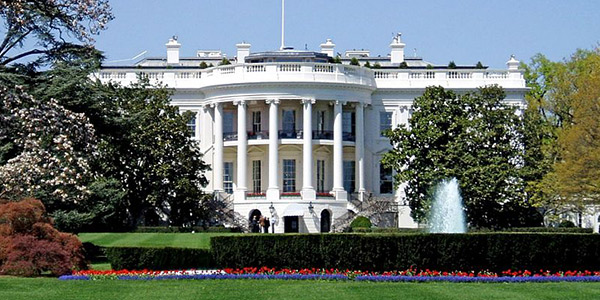The closing session of the Energy Bar Association’s annual Fall Conference on Wednesday provided insight into not just how the makeup of the U.S. government might look next year, but also how national energy and climate policies could shift.
The panelists focused on three scenarios: the status quo, in which President Trump wins re-election and Republicans retain control of the Senate; former Vice President Joe Biden winning the presidential election and the GOP keeping the Senate; and Democrats sweeping both the White House and Congress.
Not likely: Republicans flipping the House of Representatives, or Trump winning but the Senate flipping, the latter of which Kellie Donnelly, general counsel for public relations firm Lot Sixteen, said her firm has been calling a black swan event.
As of press time, data analysis website FiveThirtyEight gives Biden an 88% chance of winning the presidency and Democrats a 74% chance of winning the Senate, based on an aggregation of national polls.
Under the status quo, Donnelly said, Trump is likely to continue his “trade wars” with other countries and climate policy will go unchanged. But that would not preclude passage of a major tax and infrastructure package, “something that President Trump has long been interested in,” she said. Sens. Lisa Murkowski (R-Alaska) and Joe Manchin’s (D-W.Va.) American Energy Innovation Act, which has languished for various reasons, including the COVID-19 pandemic, “could also see new life.” (See Murkowski, Manchin Offer Bipartisan Energy Bill.)
Megan Ceronsky, executive director of the Center for Applied Environmental Law and Policy, said that under a unified Democratic government, Congress’ first acts would likely be “massive” stimulus spending to address the pandemic-induced recession. The spending could include funding for “clean energy job creation,” electric vehicle infrastructure and environmentally friendly public transportation, which she said “are really high priorities” for Biden.
Although Biden’s first priority will be addressing the economy, he often frames action on climate change as a way to alleviate the impact of the pandemic — for example, renewable energy jobs for the unemployed and cleaner air for those dealing with respiratory problems because of the virus.
Predicting “gets much trickier” under a divided-government scenario, Ceronsky said. Biden’s clean-energy priorities would likely still get more funding than under Trump, and tax credits for renewable and carbon capture projects could be extended. But instead of climate-related bills being passed, “we will see a lot of action under existing statutory authorities from the regulatory side,” she said.
Unlikely to happen under any scenario, Donnelly said, is a tax on carbon emissions. “I don’t think members [of Congress] are going to actually vote to impose a new tax on people” in the middle of a recession, she said. There are plenty of other options that Biden favors and are more politically popular, she said.
Ceronsky agreed. Even though economists agree that such a tax would be the most efficient way to reduce emissions, she said “anything that has the word ‘tax’ in it has always been a challenge for Congress.”
Will FERC be ‘Boring Again’?
The makeup of FERC after the elections will depend not just on who wins but also on the parties’ political calculus regarding the commission, the panelists said.
The president cannot fire a commissioner without cause and must select the chairman from among the sitting commissioners. If Biden wins, and pending nominees Mark Christie (R) and Allison Clements (D) are confirmed during the lame duck session, Congress would be “basically locking in a 3-2 Republican majority” for up to June 30, 2021, when current Chair Neil Chatterjee’s term ends, Donnelly said. “I can’t imagine” that Democrats would want that, she said. (See FERC Nominees Bob and Weave Through Senate Hearing.)
If the current GOP-controlled Senate elects not to confirm the two current nominees before the end of the year, it is possible that Christie, the chair of the Virginia State Corporation Commission, loses his nomination and Biden renominates Clements and another Democrat, Donnelly said.
Commissioner Richard Glick, currently the panel’s only Democrat, is almost certain to be named chair in a Biden administration, Donnelly said, although it is possible Biden could nominate someone else to be chair after Glick.
Donnelly noted that Murkowski has often said that she wants to “make FERC boring again.” But regardless of the elections, she said somewhat jokingly, “FERC is always interesting, and it will never be boring again.”
Ceronsky disagreed with that statement, saying, “We really do need to make FERC boring again; ‘boring’ in that it should be about highly competent individuals making what, to the rest of us, are a little bit hard-to-understand decisions because they are so, so in the weeds.
“I do think one thing that would change in a FERC under a Biden administration … is a reversal of the direction that the commission has gone in terms with trying to interfere with state generating resource decisions,” Ceronsky said. She called the extension of PJM’s minimum offer price rule “a pretty blatant attack on states’ authority to actually decide what type of generating resources they have. …
“I cannot see states staying in these organized markets if all of their energy policies are being countermanded by the FERC’s pricing decisions.” (See related story, FERC Acts on PJM MOPR Filing.)





